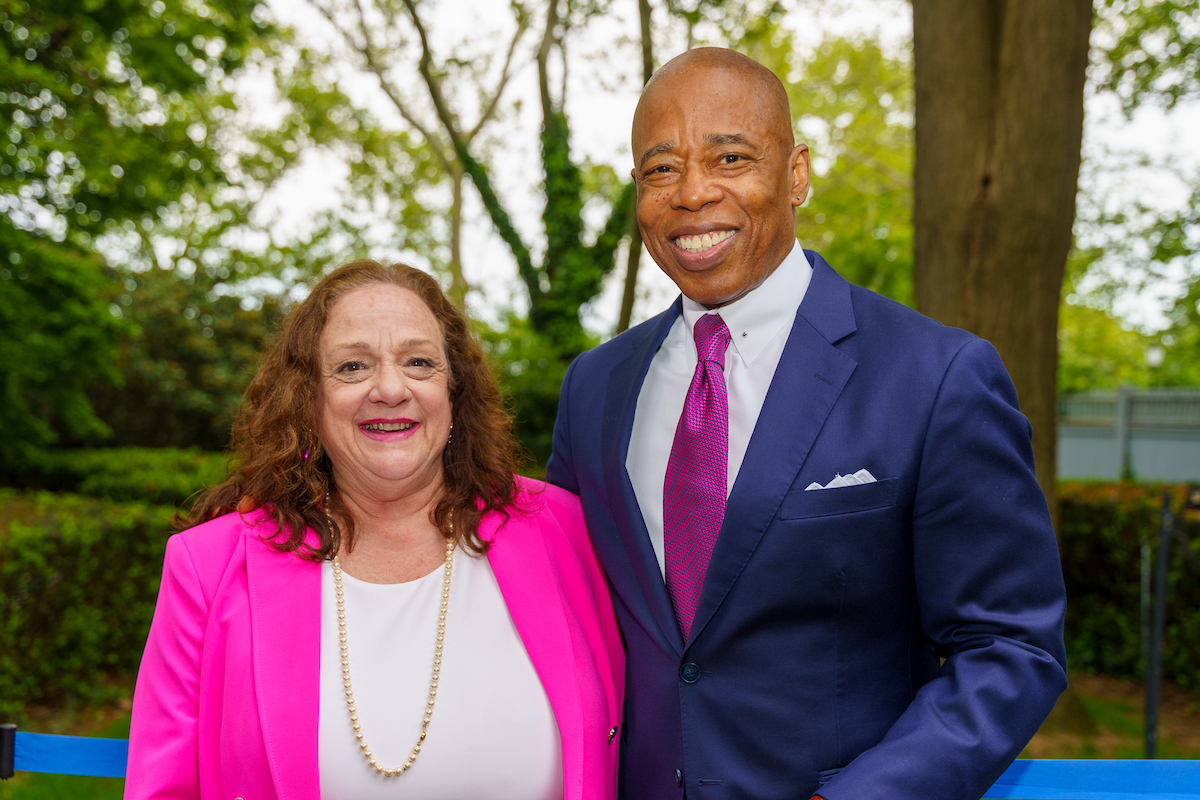Meet Donna Lanzetta, Manna Fish Farms Leader

A local entrepreneur, Donna Lanzetta’s contagious passion might take many by surprise. Lanzetta is a fish farmer. She founded and built the team at Manna Fish Farms Inc., and is working to secure permits for one of the first commercial fish farms in federal waters in the United States.
Along with NOAA’s National Center for Coastal Ocean Science (NCCOS) and other regulatory and supervisory agencies, Hampton Bays-based Manna Fish Farms is in the process of permitting ocean farms in Florida and New York federal waters. The East Quogue resident has hurdles to overcome, but her belief in the importance and urgency of what she is doing drives her forward.
Lanzetta grew up fishing for striped bass and snappers and clamming in the local bays and estuaries. Blue claw crabbing was a family favorite in the late summers, with an abundance of tasty crustaceans in the clean, fertile waters.
“When I was growing up out here, we were fishing and clamming all of the time, and I remember that you couldn’t walk in Shinnecock Bay without stepping on a clam,” Lanzetta recalls. “It has been sad to see the loss of eelgrass and shellfish in our local waterways and the degradation of the marine environment since the ‘60s, when I was digging with my feet through the eelgrass beds looking for littlenecks. This degradation and biodiversity loss must be taken as a call to action, an impetus for change.”
So what would she change? How can we all do better?
Lanzetta suggests considering the sustainability of our food sources, keeping in mind the United Nations Sustainable Development Goals (UN SDGs). Feeding the world with sustainably grown and sourced seafood is the mission of Manna Fish Farms Inc., with a commitment to 100 percent transparency.
“We must make climate-smart decisions based on science,” Lanzetta explains, “and science must drive, shape and inform ocean farming industry development.”
She says that with global populations skyrocketing and wild-capture fisheries graphed on a flat plateau, humans must look to aquaculture to meet seafood demands. Aquaculture provides an opportunity to grow seafood protein to supplement the wild catch, taking pressure off wild stocks. Ocean farming is a form of aquaculture and, “done right, ocean farming is part of the solution for a climate-smart future,” says Lanzetta.
She adds that fish farms can be sustainably operated on shore, near shore or in the open ocean marine environment. One key is balance with the environment. To establish this balance, marine spatial planning is essential in order to select a site that will naturally have the least impact, not only on the environment, but also on the numerous ocean users. Lanzetta has recently been named chairwoman of the Executive Committee of the Barcelona-based World Ocean Council, a cross-section organization of ocean businesses focused on sustainability and corporate social response.
Another key she mentions is transparency.
“It is only through transparent operations that we will garner the scientific facts and proofs to show that ocean farming can be accomplished sustainably, without harm to the environment,” Lanzetta says. “We are proud to lead the charge.”
It was this wish to feed the world sustainably grown and sourced seafood that led Lanzetta to build the seafood-centric businesses Manna Fish Farms Inc., Manna Systems Inc., Manna Seafood Blockchain Inc., and Manna at Lobster Inn Restaurant, and to establish the non-profit Manna Ocean Foundation. Together the businesses, along with university, non-profit collaborators, are working to develop Aquaculture Innovation Centers in New York, California and Florida.
“We can all benefit by eating more seafood. Seafood is the most sustainable protein people can consume,” explains Lanzetta, who adds the United States currently has a $20.3 billion trade deficit in seafood. The U.S. currently produces wonderful wild and farmed seafood, much of which is exported, despite the glaring trade deficit.
“In the U.S., we are currently importing over 90 percent of our seafood,” says Lanzetta, who adds that it’s “shocking considering the capacity of the U.S. Exclusive Economic Zone (EEZ) surrounding our country. To give you an idea of the scope of our U.S EEZ, we could farm in one-tenth of one percent of our EEZ and grow an amount equal to our total U.S. annual wild catch.”
Much of our wild catch is exported, and some of that is processed and brought back to the U.S. The plan Lanzetta and her team have is already in process. In addition to partnering to operate an established oyster farm, they are currently growing redfish to ultimately populate the Florida Gulf of Mexico net pens.
As part of a partnership with the University of Southern Mississippi (USM), Manna has captured local broodstock around the proposed farm site 23 miles off the coast of Pensacola, Fla. The fish are spawned and raised in the USM hatchery for about a year until they are big enough to populate the offshore net pens. After the first year, the fish are moved offshore into the submerged net pens, where they circulate in 9,000 cubic meters of water that is constantly flowing through the underwater pen. The storm-safe submersible net pens Manna plans to use in the ocean can be moved throughout the water column, depending upon weather conditions and fish preferences.
There is ongoing research and studies surrounding Manna’s farms, where the sensors should be placed to measure the specific environment, water quality based on site-specific details and modeling, the farm’s placement in the busy ocean environment, and the species of fish to be cultivated. Lanzetta is happy to share Manna’s plans and philosophy with others, and when she does, she often draws a crowd.
“People want to know what we are planning, why and how,” Lanzetta says. “There are outdated misperceptions circulating regarding fish farming. In fact, there can be responsible, sustainable farming in the ocean.”
In 1970, famed oceanographer Jacques Cousteau said, “We must farm the sea. That is what civilization is all about, farming replacing hunting.”
“Think about it for a moment,” Lanzetta says, “Seafood is essentially the last protein on earth to be hunted. The time is now for sustainable seafood farming — in the ocean, on land, on the coast, in fresh and saltwater environments. Currently, seafood is the fastest-growing protein segment in the world. The United Nations has urged that we must double seafood production by 2030 in order to maintain our current levels of consumption.”
Manna is in a leadership role, and takes that position very seriously.
“We are pioneers in this space,” says Lanzetta, who was a litigation, real estate, commerce and business attorney for more than 30 years before becoming a fish farmer. “We have the opportunity to set the gold standard for ocean farming, finfish farming conducted in submerged net pens, in balance with the environment and serving the marketplace’s increasing demand for delicious, healthy seafood. As more people learn about our philosophy of balancing transparency, care and respect, and our commitment to sustainability, transparency and responsibility, they will want to learn even more and taste our products.”
Todd Shapiro is an award-winning publicist and associate publisher of Dan’s Papers.



